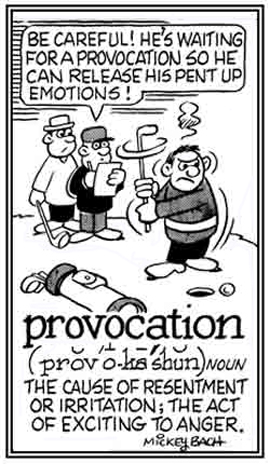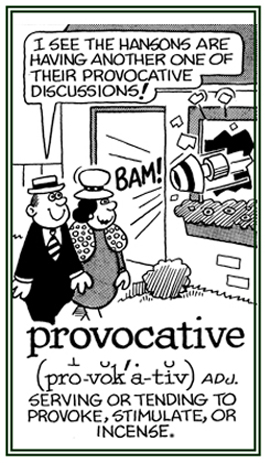voc-, voca-, vocab-, vocat-, -vocation, -vocative, -vocable, vok-, -voke
(Latin: call, talk, speak, say, voice; word)
2. Relating to that which is unalterable and cannot be called back or be undone: No matter how Harry's fellow workers pleaded with him, his decision to quit his job was irrevocable.
From Horace. Another interpretation: "Think twice before you speak."
A description of the physical effects of fear, from Virgil's Aeneid; with an equivalent meaning of, "I was scared stiff."
2. A person employed to associate with suspected illegal individuals or groups, and by pretending sympathy with their aims, incites them to commit incriminating acts that will make them liable for legal punishment: In the crime novel which Jane was reading, the police wanted a provocateur to incite a suspected criminal to commit a crime by selling drugs so they could arrest him.
3. Etymology: a shortened form of agent provocateur, "a person hired to make trouble"; from French, provocateur which came from from Latin provocator, "challenger"; from provocare, "to call forth, to challenge"; from pro-, "forth" + vocare, "to call".
"A U.S. provocateur's road to handcuffs"
James O'Keefe III made a national splash last year when he dressed up as a pimp and trained his secret camera on counselors with the liberal community group Acorn, eliciting advice on financing a brothel on videos that would threaten to become Acorn's undoing because they gave him and his partner, Hannah Giles, who posed as a prostitute, suggestions on how he could avoid being prosecuted by authorities.
2. Something that incites or encourages someone to attack others: During recess on the school playground, George started telling lies about Jack, another student in the same classroom, and this provocation resulted in Jack using his fist against George!
3. Etymology: from Old French provocation (12th century), from Latin provocationem, provocatio, "a calling forth, a challenge"; from provocatus, past particple of provocare, "to provoke"; that is, "to call forth, to challenge"; from pro-, "forth" + vocare, "to call".

Go to this Word A Day Revisited Index
so you can see more of Mickey Bach's cartoons.
Marvin's teacher was very disturbed by the provocative essay that he wrote for his English class.

Go to this Word A Day Revisited Index
so you can see more of Mickey Bach's cartoons.
Mary's son would not take "no" for an answer regarding his desire to go to a late movie and so he provoked her into making him stay in his room and go to bed earlier than usual.
2. Producing a response to an occasion or a cause in an emotional way: Hank's reaction to his wife's death provoked a lot of sympathy by their friends.3. To stir someone to an emotion or a response: The newspaper article about a woman not being able to become the President of the United States provoked Mike's wife to write a letter to the publisher.
4. To bring something about intentionally by stirring up, arousing, or calling forth feelings, desires, or some responsive activity: Jerry played music in his room very loudly because he was provoked and distressed by his parents because they wouldn't allow him to stay out late with his friends.
2. An action or words which trigger positive or negative responses from someone or from a group of people: The driver drove at a very high speed, overtaking all of the cars on the freeway, and this provokingness caused angry feelings and reactions from the other drivers, who drove according to the speed limit.


